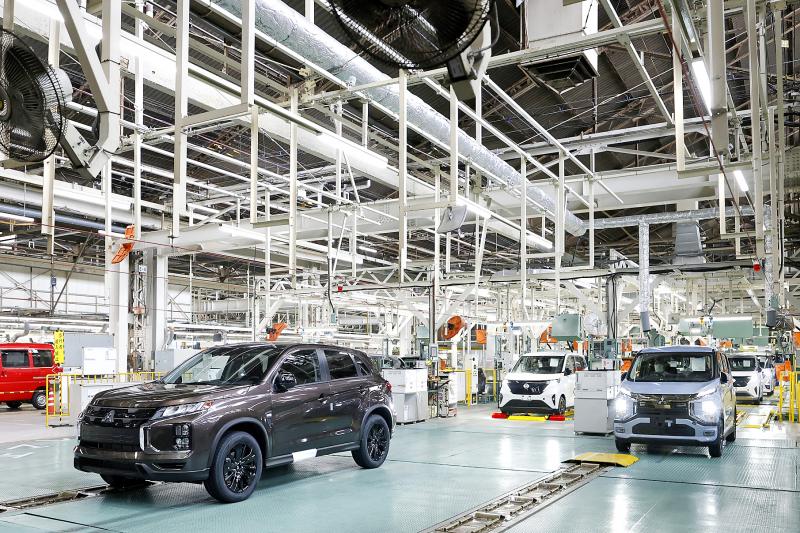Nissan Motor Co and Mitsubishi Motors Corp have unveiled two new electric mini vehicles, betting that consumers would embrace their battery-powered take on a well-loved class of the tiny, affordable Japanese.
Marking a key push into an less-served part of the electric vehicle (EV) market that could help spur wider adoption, the heads of the two automakers yesterday took the wraps off Nissan’s “Sakura” and Mitsubishi’s “eK X EV.” The two small, boxy EVs are set to go on sale in Japan this summer at a starting price of less than US$15,000.
Small and affordable “kei” mini vehicles are a popular means of transportation in Japan, especially among workers and families living outside of major cities where roads are narrow and public transport networks are sparse. In 2020, they made up more than one-third of new passenger car registrations in Japan.

Photo: Bloomberg
“What Nissan and Mitsubishi are doing, this is the way it should be,” said Takeshi Miyao, an analyst at automotive consultancy Carnorama, referring to their carmaking alliance that also includes Renault SA and has been strained in recent years. “This technology is going to be beneficial for the alliance.”
However, as automakers push to green up their lineups and the Japanese government aims for the country to go net-zero emission by 2050, the kei class of vehicle has been highlighted as one that is especially difficult to electrify. Others have said that adding batteries to kei cars could push their price to a point where they become out of reach for traditional buyers.
The cost of buying kei EVs should eventually fall to less than ¥1.5 million (about US$11,700), Miyao said.
Nissan and Mitsubishi’s joint models get pretty close. After subsidies, both cars start at about ¥1.8 million. While that is on the pricey side for the category, Japanese automakers have been nudging them higher in recent years, adding more features and safety technology.
Developed by the two automakers’ joint venture, NMKV Co, the vehicles are fitted with small 20 kilowatt-hour batteries, giving them “enough cruising range to meet daily needs,” Nissan CEO Makoto Uchida said, speaking at an event in Okayama. “I hope many customers will be able to experience the benefits electric vehicles can offer.”
Other automakers, including Honda Motor Co and Daihatsu Motor Co, a unit of Toyota Motor Corp, are also laying out plans to roll out their own electric mini models within the next few years — moves that could speed up Japan’s relatively slow embrace of EVs.
For now, Nissan and Mitsubishi will be first out of the gate.
The reception of their kei EVs will give some indication of how other automakers will fare in the age of the electrified mini car, Miyao said.

By 2027, Denmark would relocate its foreign convicts to a prison in Kosovo under a 200-million-euro (US$228.6 million) agreement that has raised concerns among non-governmental organizations (NGOs) and residents, but which could serve as a model for the rest of the EU. The agreement, reached in 2022 and ratified by Kosovar lawmakers last year, provides for the reception of up to 300 foreign prisoners sentenced in Denmark. They must not have been convicted of terrorism or war crimes, or have a mental condition or terminal disease. Once their sentence is completed in Kosovan, they would be deported to their home country. In

Brazil, the world’s largest Roman Catholic country, saw its Catholic population decline further in 2022, while evangelical Christians and those with no religion continued to rise, census data released on Friday by the Brazilian Institute of Geography and Statistics (IBGE) showed. The census indicated that Brazil had 100.2 million Roman Catholics in 2022, accounting for 56.7 percent of the population, down from 65.1 percent or 105.4 million recorded in the 2010 census. Meanwhile, the share of evangelical Christians rose to 26.9 percent last year, up from 21.6 percent in 2010, adding 12 million followers to reach 47.4 million — the highest figure

LOST CONTACT: The mission carried payloads from Japan, the US and Taiwan’s National Central University, including a deep space radiation probe, ispace said Japanese company ispace said its uncrewed moon lander likely crashed onto the moon’s surface during its lunar touchdown attempt yesterday, marking another failure two years after its unsuccessful inaugural mission. Tokyo-based ispace had hoped to join US firms Intuitive Machines and Firefly Aerospace as companies that have accomplished commercial landings amid a global race for the moon, which includes state-run missions from China and India. A successful mission would have made ispace the first company outside the US to achieve a moon landing. Resilience, ispace’s second lunar lander, could not decelerate fast enough as it approached the moon, and the company has

‘THE RED LINE’: Colombian President Gustavo Petro promised a thorough probe into the attack on the senator, who had announced his presidential bid in March Colombian Senator Miguel Uribe Turbay, a possible candidate in the country’s presidential election next year, was shot and wounded at a campaign rally in Bogota on Saturday, authorities said. His conservative Democratic Center party released a statement calling it “an unacceptable act of violence.” The attack took place in a park in the Fontibon neighborhood when armed assailants shot him from behind, said the right-wing Democratic Center, which was the party of former Colombian president Alvaro Uribe. The men are not related. Images circulating on social media showed Uribe Turbay, 39, covered in blood being held by several people. The Santa Fe Foundation